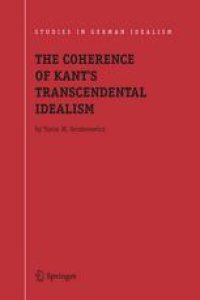
Ebook: The Coherence of Kant's Transcendental Idealism
Author: Yaron M. Senderowicz (auth.)
- Tags: Metaphysics, Philosophy
- Series: Studies in German Idealism 4
- Year: 2005
- Publisher: Springer Netherlands
- Edition: 1
- Language: English
- pdf
1. Introduction Kant considered the doctrine of transcendental idealism an indisp- sable part of the theory of knowledge presented in the Critique of Pure Reason. My aim in this book is to present a new defense of the coh- ence and plausibility of Kant’s transcendental idealism and its indisp- sability for his theory of knowledge. I will show that the main argument of the Transcendental Aesthetic and the Transcendental Analytic is - fensible independently of some of Kant’s claims which are said to threaten its coherence. I have undertaken an inquiry into the coherence of Kant’s transc- dental idealism for the following reasons. A defense of the coherence of transcendental idealism is required by the existing state of Kantian scholarship. The claim that Kant’s transcendental idealism is incoh- ent has appeared in various forms over the last two centuries. The most powerful and elaborate criticism of Kant’s transcendental idealism is found in Part Four of Strawson’s The Bounds of Sense. Several comm- tators have tried to reestablish its coherence. Although Allison and other commentators have contributed ideas that are valuable for an 1 account of the coherence of Kant’s transcendental idealism, their - guments fall short as a response to the standard objection. Indeed, the claim that Kant’s transcendental idealism is incoherent continues to be the view held by most thinkers. I have limited my goal in this book to establishing the coherence of Kant’s transcendental idealism due to two related reasons.
This book presents a new interpretation of Kant’s theory of knowledge that emphasizes the coherence and plausibility of his doctrine of transcendental idealism. Many interpreters believe that Kant’s transcendental idealism is an incoherent theory. Some have attempted to respond to this charge. Yet, as the author demonstrates, the interpretations that seek to vindicate Kant’s theory continue to be committed to some claims that evoke the charge of incoherence. One type of claim which does so is connected to the contradictory notion of subjective necessity. The other type of claim is related to the supposition that knowledge of the reality of appearances entails knowledge of the reality of things in themselves. The interpretation presented in this book does not involve any of these claims. Part One of this book presents an analysis of Kant’s concept of a priori knowledge and of his response to skepticism about synthetic a priori knowledge that specifies the content of such knowledge without invoking the notion of subjective necessity. Part Two presents an account of the non-spatiotemporality of things in themselves that does not entail knowledge of the reality of things in themselves. Part Three presents a new interpretation of transcendental synthesis, the transcendental "I" and of the role of transcendental self-consciousness in synthetic a priori knowledge which emphasizes the originality of Kant’s account of self-knowledge and subjectivity. The arguments presented in this book relate Kant’s ideas to current debates in epistemology, metaphysics and the philosophy of mind in a way that underscores their invaluable relevance to present-day philosophical discourse.